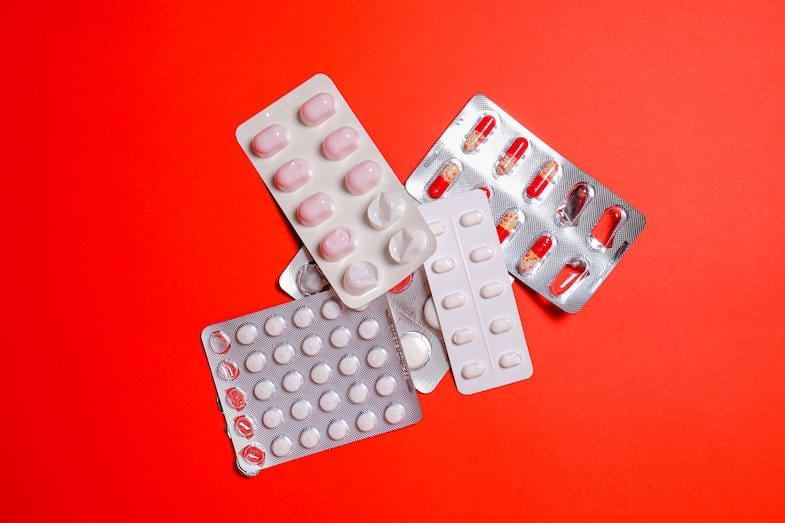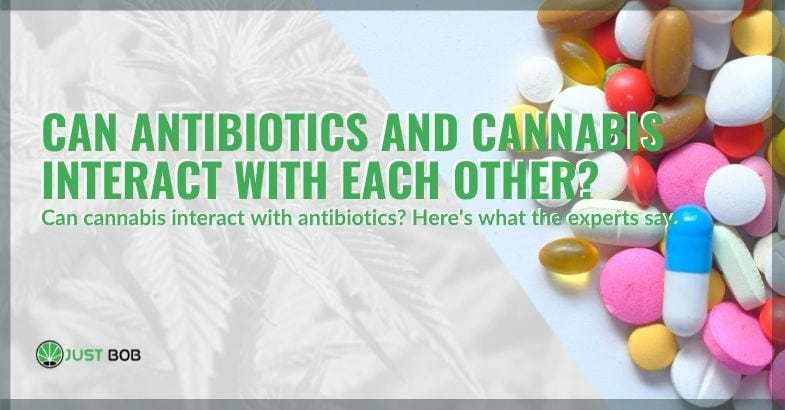Modified on: 15/01/2024
CAN CANNABIS INTERACT WITH ANTIBIOTICS? HERE’S WHAT THE EXPERTS SAY
If you wonder what the consequences might be, you are in the right place.
Since there is still so much confusion on the subject, this article aims to provide clarity.
That is why we will now look at how cannabis and antibiotics are metabolized by the human body, and what happens if they are taken together.
Ready?
Before starting we want to remember you CBD weed is completely legal in the UK!
Let’s do it!


How marijuana and drugs are metabolized in the body
With impeccable internal functioning, our bodies direct these external particles directly to the liver for what is called the ‘first-pass effect’, whose function is to trap, reduce and rapidly eliminate toxins that could poison the rest of the body.
The liver has the job of reducing molecules into even smaller components that the body can absorb as nutrients.
OK, but what does all this have to do with cannabis and antibiotics?
To answer this, we need to take a step back.
In our bodies there are particular enzymes, called cytochromes, that selectively bind to natural and manufactured drugs, metabolizing them: through their action, they reduce up to 73% of a drug’s initial potency.
And what happens to the remaining 27%?
What remains of the drug (or cannabis and its derivatives) circulates in our bloodstream, reaching all organs, including the brain, heart, and kidneys.
The function of our liver is to ‘take the hits’, and it is an exceptionally resilient organ.
However, there are ‘methods’ to circumvent this first-pass metabolism and bypass the natural pathway of digestion: injecting, spraying, inhaling substances or even directly impregnating the mucous membranes would allow molecules to enter the bloodstream, avoiding being trapped by the liver.
Some traditional drugs (such as inhalants and insulin) have been developed with this in mind.
Some recreational drugs, such as cocaine or heroine, exploit this advantage, with dramatic effects, as the potency of the substances is close to 100% (precisely because they evade hepatic metabolism).
What about antibiotics?
Antibiotics are known to ‘disrupt’ the cytochrome system.
Ciprofloxacin, for example, inhibits these enzymes, thus influencing other drugs or metabolites that use the same system, thereby enhancing them.
Other drugs, however, have the opposite effect. Sulphonamides or alcohol, for example, accelerate the cytochrome system, which in turn accelerates the metallization of other drugs, reducing their finely regulated potency.
Read also: What is autochthonous cannabis and what are the best-known varieties
So, how do antibiotics interact with marijuana?
To begin with, we know that the cytochrome system metabolizes THC.
That said, we don’t know whether it inhibits or activates the system.
With so many enzymes involved in the cytochrome system, cannabis can:
- inhibit some;
- induce others;
- have no effect on still others.
For this reason, we do not know how antibiotics or other drugs can affect the potency of the THC present in marijuana.
However, we can draw a couple of conclusions.
First, most cannabis is inhaled (like CBD flowers that can be vaporized), not ingested, so the first step is skipped anyway.
Second, most patients ingest such small doses of cannabis that they are unlikely to affect the cytochrome system. At most, some drugs that accelerate the efficiency of the cytochrome system might reduce the potency of cannabis.
The user can therefore balance doses according to their effects.
Have you ever wondered why edibles seem more potent and last longer?
How is this possible if the first step of metabolism metabolizes THC? We can turn to our extensive knowledge of metabolism to explain this dilemma.
As we mentioned earlier, cannabis particles (THC, CBD, etc.) enter the liver’s cytochrome system to be further metabolized. It has been discovered that one of the derivatives of THC metallization is 11-hydroxy-THC, which is more potent than THC because it remains in the body longer.
This is an unintended consequence of metabolism that explains how, in very rare cases, some drug metabolites are more potent than their precursors.


Interaction of cannabis and antibiotics? Here are the conclusions we can draw.
That said, there is anecdotal evidence that THC combined with various types of drugs exacerbates side effects (different from CBD effects).
Drugs such as SSRI antidepressants or anticholinergics (such as diphenhydramine and some antipsychotics) are known to have unpleasant side effects, such as dry mouth or loss of balance.
THC can make these symptoms worse.
This does not mean that they cannot be used in combination; rather, patients should note any symptoms or side effects to inform their doctor.
In time, health professionals will have a much more profound understanding of cannabis metabolism and the interactions to avoid.
For now, it is best to maintain a cautious approach to mixing antibiotics and other drugs with marijuana.
Read also: Cannabis bubblegum: characteristics, aroma and effects
Can you smoke while taking medication?
In recent years, the discussion around cannabis consumption has expanded to include its potential interaction with various medications. One common concern is whether either smoking marijuana or consuming cannabis is advisable while taking prescription medications, particularly when taking antibiotics alone. This article aims to address this issue, examining the potential risks and benefits associated with combining cannabis use and medication, with a focus on antibiotics.
Antibiotics are often prescribed to combat bacterial infections, and their efficacy can be crucial in promoting recovery. However, questions arise when patients contemplate smoking cannabis while taking antibiotics or using cannabis products alongside antibiotic treatment. It’s important to understand the potential consequences of such combinations and whether they may lead to adverse reactions or impact the effectiveness of antibiotics.
Research indicates that cannabis, particularly certain cannabinoids found in cannabis plants, possesses antibacterial properties. While this has sparked interest in exploring the therapeutic potential of cannabis in treating infections, caution is advised. The interaction between cannabis and antibiotics, such as macrolide antibiotics or commonly prescribed ones like amoxicillin and clavulanate combination, is a complex area that requires further investigation.
Healthcare professionals emphasize the importance of transparency regarding cannabis use, as it may significantly interfere with the metabolic pathways of certain medications. Smoking weed or consuming cannabis products may influence drug interactions and, in some cases, compromise the intended therapeutic effects of some prescription drugs and antibiotics.
One concern is the potential impact cannabis reduce on antibiotic resistance, a global health issue. Some enthusiasts speculate about marijuana’s antibacterial effects and its role in addressing antibiotic-resistant bacteria, but more research is needed to validate these claims.
Patients undergoing antibiotic usage for urinary tract or respiratory infections should exercise caution when considering cannabis consumption. The possible adverse reactions and the intricate relationship between cannabis and common antibiotics should be discussed openly with healthcare providers to ensure informed decision-making.
While the immune system plays a crucial role in fighting infections, the impact of cannabis use on the immune system, especially when combined with antibiotic usage, requires further investigation. Additionally, the potential for drug interactions with other medications underscores the need for healthcare professionals to be aware of patients’ cannabis consumption habits.
Exploring the Relationship Between Medical Marijuana and Antibiotic Use
Medical cannabis has gained significant attention in recent years for its potential therapeutic properties. As more states legalize its use for medicinal purposes, questions arise about the interaction between medical weed and conventional antibiotic treatments. This article aims to shed light on this complex topic, exploring the potential benefits and risks associated with the simultaneous use of medical cannabis and antibiotics.
Medical professionals often consume cannabis to prescribe antibiotics to treat bacterial infections, employing various classes of antibiotics such as macrolides, penicillins, and cephalosporins. However, concerns arise when patients, also prescribed medical weed for pain management or other health conditions, consider smoking or consuming cannabis while undergoing antibiotic usage.
Studies suggest that certain cannabinoids found in cannabis possess antibacterial properties. However, the extent to which cannabis can effectively replace antibiotics in treating serious infections remains a subject of ongoing research. Antibiotic resistance, a growing concern globally, poses a significant health risk. Some enthusiasts speculate about marijuana’s potential role in addressing this issue, but caution is essential.
While medical marijuana may offer anti-inflammatory properties and pain management benefits, its interaction with prescribed antibiotics raises concerns about adverse effects and potential drug interactions. Healthcare professionals emphasize the importance of consulting with a qualified medical practitioner before combining weed use with antibiotic usage.
It’s crucial to note that smoking weed or consuming cannabis products may interact negatively with certain antibiotics, affecting their metabolic pathways and potentially reducing their efficacy. The exact impact varies depending on the specific antibiotics prescribed and the individual’s health conditions.
Medical marijuana users should be cautious when considering cannabis consumption while taking antibiotics for urinary tract or respiratory infections. The potential for adverse reactions respiratory infection in cannabis users and the risk of compromising antibiotic effectiveness in treating common bacterial and viral infections, should not be overlooked.
Research on the interaction between smoking cannabis and antibiotics is ongoing, and more studies are needed to provide a comprehensive understanding of the subject. Doctors stress the importance of transparency regarding smoke weed to ensure appropriate adjustments to antibiotic prescriptions and minimize potential health risks.
In conclusion, while medical marijuana holds promise for various health conditions, its use alongside antibiotic treatment requires careful consideration. Patients are encouraged to consult with their healthcare providers, disclose their smokke weed, and stay informed about potential interactions prescription marijuana replace antibiotics have. A collaborative approach between doctors and patients will contribute to a more nuanced understanding of the relationship between medical weed use and antibiotics.
Exploring the Interplay between Medical Cannabis and Bacterial Infections
In recent years, the discourse surrounding medical smoke weed has expanded to include its potential impact on bacterial infections, prompting a closer look at the intricate relationship between cannabis use and antibiotic treatments. As individuals seek alternative or complementary therapies, questions arise about the safety and efficacy of consuming cannabis while undergoing antibiotic regimens, especially for common bacterial infections.
Patients prescribed antibiotics for bacterial infections may wonder whether it is safe to consume cannabis during their treatment. This concern extends to various forms of cannabis consumption, including smoking weed, consuming cannabis edibles, or using THC-infused products. The need for clarity on this matter is underscored by the growing popularity of medical weed, often obtained through a medical marijuana card.
One key consideration is the potential interaction between cannabis and common antibiotics. While some speculate about the ability of cannabinoids to replace antibiotics, caution is advised. In particular, the emergence of antibiotic-resistant strains, such as Staphylococcus aureus, raises questions about whether cannabis can play a role in treating or preventing such infections.
Research into the effects of cannabis on specific bacterial strains, including gram-negative bacteria associated with respiratory and lung infections, is ongoing. Understanding how cannabis may impact the processes of major cannabinoids found in the human body, including the five major cannabinoids, is crucial for healthcare professionals and providers.
Patients should be mindful of potential drug interactions between cannabis and prescribed antibiotics, as well as how cannabis may influence pain receptors and exacerbate respiratory conditions. Healthcare professionals play a pivotal role in guiding patients through these considerations, emphasizing the need for more research to fully comprehend the implications of consuming cannabis while taking antibiotics.
As individuals explore the possibilities of mixing THC with antibiotic treatments or using cannabis-infused products like THC syrup, it becomes essential to evaluate the potential risks and benefits. While intoxicating cannabinoids may offer therapeutic effects, their interaction with antibiotic processes requires careful examination.
In conclusion, the interplay between medical weed affect antibiotics and bacterial infections is a complex and evolving area. Patients, in consultation with healthcare providers, should navigate this terrain cautiously, considering the nuances of their specific antibiotic regimens and overall health conditions. As more research unfolds, a clearer understanding of the compatibility between medical weed and antibiotics will emerge, providing valuable insights for both patients and healthcare professionals alike.
Conclusions
In this article, we have seen how cannabis might interact with antibiotics.
Should you be taking both substances, please consult your doctor first so that we can assess the situation together.
To make sure you don’t miss any updates, visit the Justbob website and discover all top-quality legal marijuana and legal hash products.
We look forward to seeing you in our CBD shop online!









